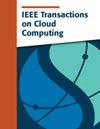PPSKSQ: Towards Efficient and Privacy-Preserving Spatial Keyword Similarity Query in Cloud
IF 5
2区 计算机科学
Q1 COMPUTER SCIENCE, INFORMATION SYSTEMS
引用次数: 0
Abstract
The growth of cloud computing has led to the widespread use of location-based services, such as spatial keyword queries, which return spatial data points within a given range that have the highest similarity in keyword sets to the user’s. As the volume of spatial data increases, providers commonly outsource data to powerful cloud servers. Because cloud servers are untrustworthy, privacy-preserving keyword query schemes have been proposed. However, existing schemes consider only location queries or exact keyword matching. To address these issues, we propose the Privacy-Preserving Spatial Keyword Similarity Query Scheme (PPSKSQ), designed to search for spatial data points with the highest similarity while protecting the privacy of outsourced data, query requests, and results. First, we design two sub-protocols based on improved symmetric homomorphic encryption (iSHE): iSHE-SC for secure size comparison and iSHE-SIP for secure inner product computation. Then, we encode range information and integrate it with a quadtree to construct a novel index structure. Additionally, we use the Jaccard to measure similarity in conjunction with the iSHE-SC protocol, transforming similarity comparison into a matrix trace operation. Finally, rigorous security analysis and extensive simulation experiments confirm the flexibility, efficiency, and scalability of our scheme.基于PPSKSQ的云空间关键字相似度查询
云计算的发展导致了基于位置的服务的广泛使用,例如空间关键字查询,它返回给定范围内的空间数据点,这些数据点在关键字集中与用户的相似度最高。随着空间数据量的增加,提供商通常将数据外包给功能强大的云服务器。由于云服务器不可信,人们提出了保护隐私的关键字查询方案。然而,现有的方案只考虑位置查询或精确关键字匹配。为了解决这些问题,我们提出了保护隐私的空间关键字相似度查询方案(PPSKSQ),该方案旨在搜索具有最高相似度的空间数据点,同时保护外包数据、查询请求和结果的隐私。首先,我们设计了两个基于改进对称同态加密(iSHE)的子协议:用于安全大小比较的iSHE- sc协议和用于安全内积计算的iSHE- sip协议。然后,我们对范围信息进行编码,并将其与四叉树进行整合,构造出一种新的索引结构。此外,我们使用Jaccard与iSHE-SC协议一起测量相似性,将相似性比较转换为矩阵跟踪操作。最后,经过严格的安全性分析和大量的仿真实验,验证了该方案的灵活性、高效性和可扩展性。
本文章由计算机程序翻译,如有差异,请以英文原文为准。
求助全文
约1分钟内获得全文
求助全文
来源期刊

IEEE Transactions on Cloud Computing
Computer Science-Software
CiteScore
9.40
自引率
6.20%
发文量
167
期刊介绍:
The IEEE Transactions on Cloud Computing (TCC) is dedicated to the multidisciplinary field of cloud computing. It is committed to the publication of articles that present innovative research ideas, application results, and case studies in cloud computing, focusing on key technical issues related to theory, algorithms, systems, applications, and performance.
 求助内容:
求助内容: 应助结果提醒方式:
应助结果提醒方式:


